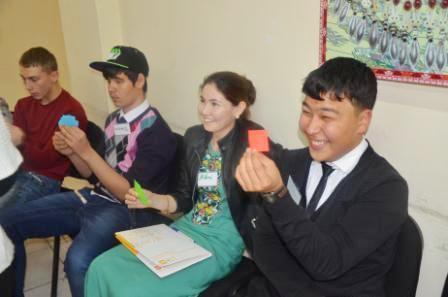Y-PEER training for trainers was conducted by the UNFPA Youth Outreach specialist and Y-PEER master-trainers in Ashgabat among twenty teenagers to expand the pool of young leaders, who are interested in promoting healthy lifestyle among their peers.
The 3-day training for trainers (ToT) covered various aspects of healthy lifestyle, with particular focus on adolescent reproductive health. The participants improved their knowledge on the issues of bad habits and their effect on reproductive health, family planning, gender equality, prevention of sexually transmitted diseases, including HIV, among other issues.
“This is my first training as a master trainer and I would like to say that I’m lucky,” shared Dasha, 16 year old Y-PEER volunteer. “We have such an energetic and insightful group of new volunteers. We didn’t expect to have such live discussions and thought-provoking questions. By the end of the training, it was clear that all of the given information was fully internalized, as they did an outstanding job conducting a test-training on the third day.”
Different interactive methods and techniques were introduced to the youth in conducting sessions, ranging from thematic games to theatre-based education. Following the training, the young volunteers will be able to conduct sessions on healthy lifestyle among their peers at their schools and beyond.
“The games and interactive activities used at the training were an excellent way to lure and keep our attention” said Lera, 15, newly recruited volunteer. “These techniques got us so interested that it stimulated an environment where we were challenged to re-think our way of life. We raised questions and discussed our thoughts, and together tried to find answers.”
There is evidence that when it comes to their health, teenagers are more likely to turn for an advice and listen to their peers rather than adults. If young people have wider access to reproductive health information, they are better able to make responsible choices related to their health. That’s why an important aspect of the Y-PEER youth center is that it provides a platform for Turkmen teenagers to promote healthy lifestyle among their peers, using so-called “peer-to-peer” approach.
“At this ToT we received accurate information about healthy lifestyle, including the issues of reproductive health,” added Lera. “Most of our peers do not know this information or think they know, but there is a lot of misconception. We are given only one healthy life, so we need to carefully take care of it.”
Dozens of adolescents visit Y-PEER youth center on daily basis. Among many daily activities, young people can choose between Y-PEER sessions, mini-sessions, group discussions and services of the professional psychologist, who also regularly conducts trainings and information sessions.
Y-PEER, the Youth Peer Education Network, is a groundbreaking and comprehensive youth-to-youth initiative pioneered by UNFPA. Y-PEER is a network of more than 500 non-profit organizations and governmental institutions; its membership includes thousands of young people who work in the many areas surrounding adolescent reproductive health.
UNFPA: Delivering the world where every pregnancy is wanted, every childbirth is safe, and every young person’s potential is fulfilled.
For additional information, please contact:
Yelena Butova, Education Advisor
Ene Tuyliyeva, Advocacy Communication Associate
Tel: 425250
Web: www.unfpa.org.tm


